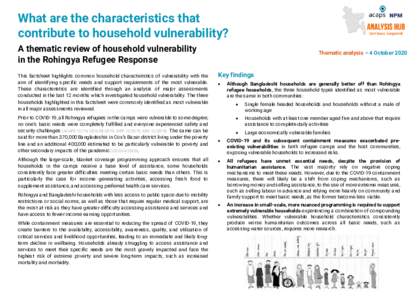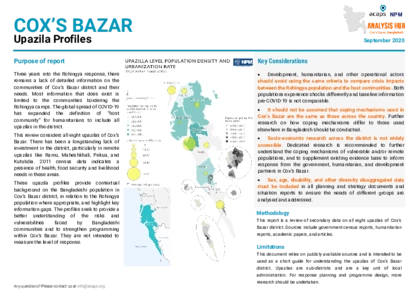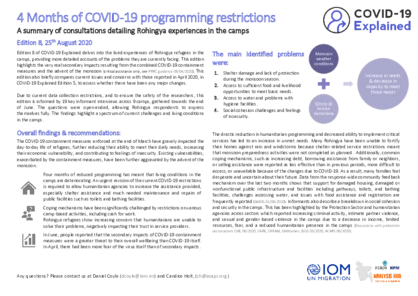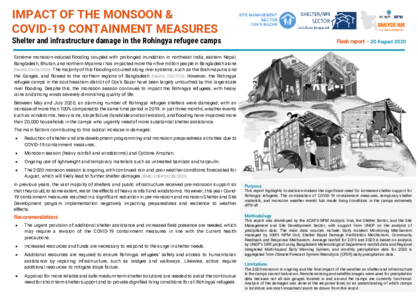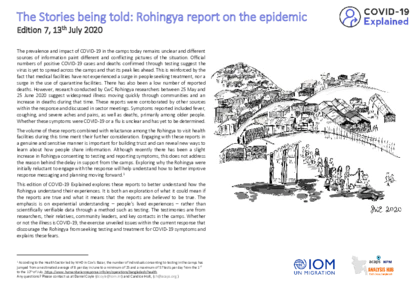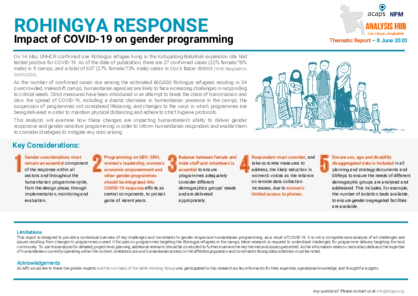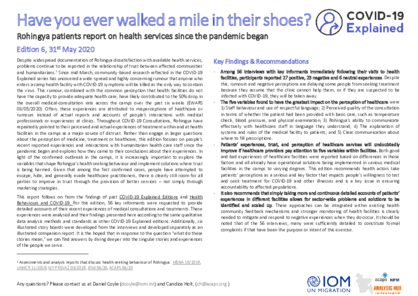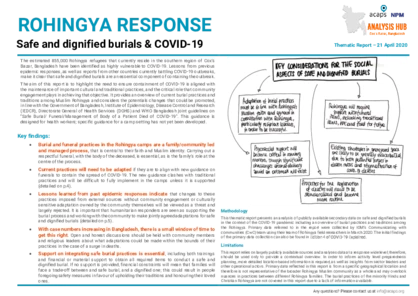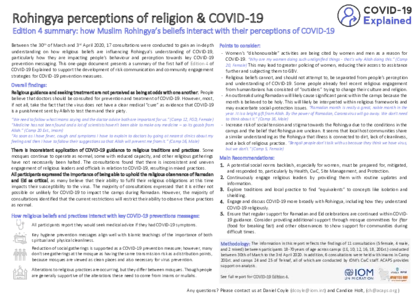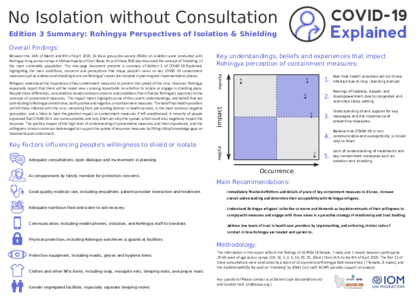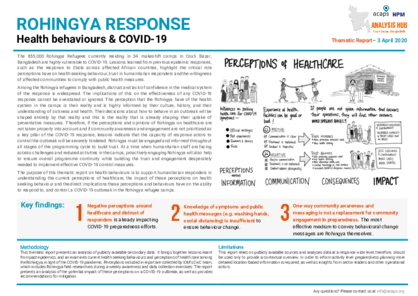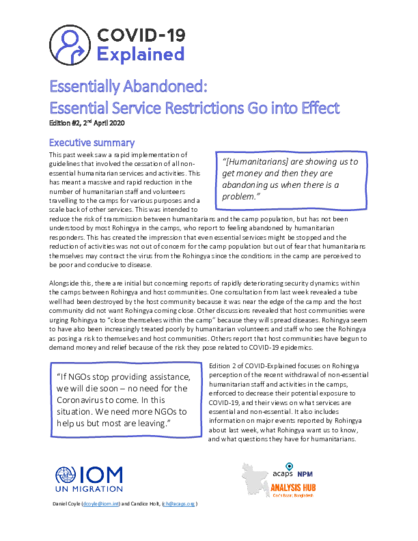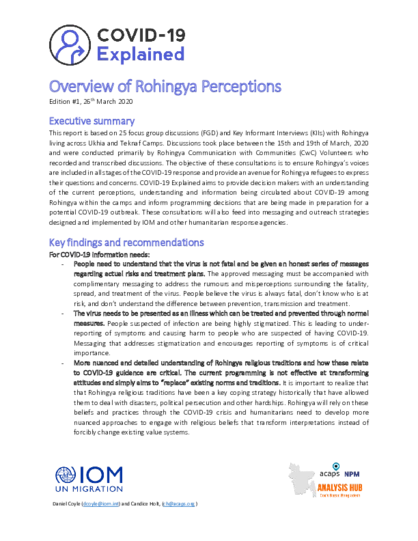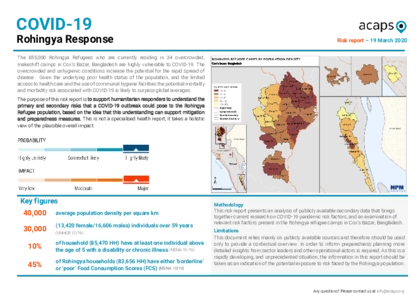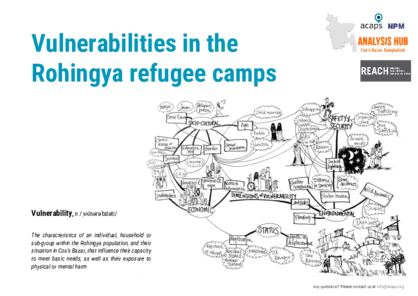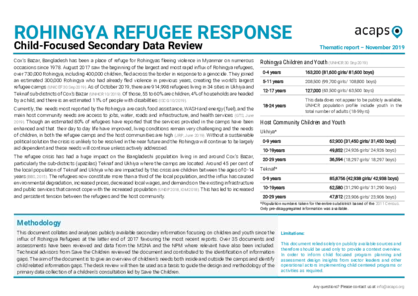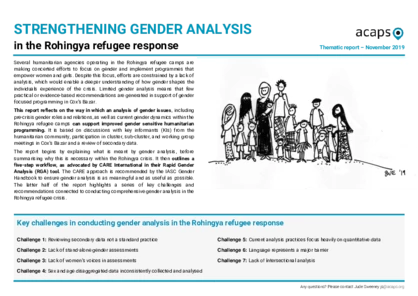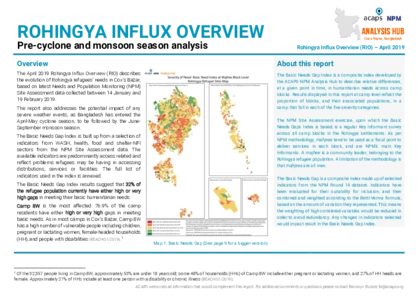Explore our
analysis products
archive
06 October 2020
Bangladesh: Characteristics of vulnerable households in the Rohingya refugee response
DOCUMENT / PDF / 418 KB
The report and audio discussion - the first in a series of pilot audio discussions on work done by the ACAPS-NPM Analysis Hub in Cox's Bazar - highlights the common household characteristics of vulnerability, with the aim of identifying the specific needs and support requirements of the most vulnerable.
Attached resources
01 October 2020
Bangladesh: Upazila Profiles in Cox's Bazar
DOCUMENT / PDF / 2 MB
This review considers all eight upazilas of Cox’s Bazar. The profiles seek to provide a better understanding of the risks and vulnerabilities faced by Bangladeshi communities and to strengthen programming within Cox’s Bazar. They are not intended to measure the level of response.
25 August 2020
Bangladesh: Covid-19 Explained, Four Months of COVID-19 programming restrictions
DOCUMENT / PDF / 279 KB
This edition of the COVID-19 Explained report delves into the lived experiences of Rohingya refugees in the camps, providing more detailed accounts of the problems they are currently facing. It highlights the very real secondary impacts resulting from the combined COVID-19 containment measures and the advent of the monsoon.
20 August 2020
Rohingya refugee: Impact of the monsoon and Covid-19 containment measures
DOCUMENT / PDF / 361 KB
This report highlights to decision-makers the significant need for increased shelter support for Rohingya refugees. The combination of COVID-19 containment measures, temporary shelter materials, and monsoon weather events has made living conditions in the camps extremely difficult.
17 July 2020
Covid-19 Explained: Rohingya report on the epidemic, the stories being told
DOCUMENT / PDF / 1 MB
This edition of 'COVID-19 Explained' aims at better understanding how the Rohingya people perceive their own experiences. The emphasis is on experiential understanding – people’s lived experiences – rather than scientifically verifiable data through a method such as testing. The testimonies are from researchers, their relatives, community leaders, and key contacts in the camps.
07 July 2020
Short and long term impacts of existing COVID-19 containment measures in Rohingya Refugee Camps
DOCUMENT / PDF / 327 KB
This report touches on major information gaps that impact the response’s ability to understand the current state of the pandemic in Cox’s Bazar and aims to draw attention to the potential negative secondary impacts resulting from existing COVID-19 containment measures.
08 June 2020
Bangladesh: Impact of COVID-19 on gender programming, Rohingya response
DOCUMENT / PDF / 531 KB
This analysis examines how COVID-19 measures are impacting humanitarian’s ability to deliver gender responsive and gender sensitive programming for the Rohingya. It aims to inform humanitarian responders and enable them to consider strategies to mitigate any risks arising.
02 June 2020
Bangladesh: Covid-19 Explained, Rohingya patients report on health services
DOCUMENT / PDF / 361 KB
This report follows on from the findings of past COVID-19 Explained Editions and Health Behaviours and COVID-19. For this edition, 56 key informants were requested to provide detailed accounts of their recent experiences of medical consultations and treatments.
Attached resources
04 May 2020
Bangladesh: Covid-19 Explained, Different and Unequal
DOCUMENT / PDF / 241 KB
This edition of COVID-19 Explained explores the differences in attitudes, knowledge and understanding of COVID-19 between key demographic groups. It aims to support nuanced communication strategies and programmatic consideration of affected populations’ ages, genders, population groups and abilities.
Attached resources
21 April 2020
Rohingya response: Safe and dignified burials and COVID-19
DOCUMENT / PDF / 519 KB
This thematic report presents an analysis of publicly available secondary data on safe and dignified burials in the context of the COVID-19 pandemic including an overview of burial practices and traditions among the Rohingya,
19 April 2020
Bangladesh: Covid-19 Explained, The spaces between Allah and Science (summary)
DOCUMENT / PDF / 229 KB
This one-page document presents a summary of the first half of Edition 4 of COVID-19 Explained to support the development of risk communication and community engagement strategies for COVID-19 prevention measures.
Attached resources
09 April 2020
Bangladesh: Covid-19 Explained, No isolation without consultation
DOCUMENT / PDF / 195 KB
This series of reports is based on focus group discussions and Key Informant Interviews with Rohingya living across Ukhia and Teknaf Camps. The objective of these consultations is to ensure Rohingya’s voices are included in all stages of the COVID-19 response and provide an avenue for Rohingya refugees to express their questions and concerns.
Attached resources
03 April 2020
Rohingya response: Health behaviours & COVID-19
DOCUMENT / PDF / 999 KB
The purpose of this report is to support humanitarian responders in understanding the current perceptions of healthcare, the impact of these perceptions on health seeking behaviour and the direct implications these perceptions and behaviours have on the ability to respond to, and control, a COVID-19 outbreak in the Rohingya refugee camps.
02 April 2020
Bangladesh: Covid-19 Explained, Essentially Abandoned
DOCUMENT / PDF / 326 KB
This series of reports is based on focus group discussions and Key Informant Interviews with Rohingya living across Ukhia and Teknaf Camps. The objective of these consultations is to ensure Rohingya’s voices are included in all stages of the COVID-19 response and provide an avenue for Rohingya refugees to express their questions and concerns.
26 March 2020
Bangladesh: Covid-19 Explained, Overview of Rohingya Perceptions
DOCUMENT / PDF / 359 KB
This series of reports is based on focus group discussions and Key Informant Interviews with Rohingya living across Ukhia and Teknaf Camps. The objective of these consultations is to ensure Rohingya’s voices are included in all stages of the COVID-19 response and provide an avenue for Rohingya refugees to express their questions and concerns.
20 March 2020
COVID-19: Impact on the Rohingya response
DOCUMENT / PDF / 893 KB
The purpose of this risk report is to support humanitarian responders to understand the primary and secondary risks that a COVID-19 outbreak could pose to the Rohingya Refugee population, based on the idea that this understanding can support mitigation and preparedness measures. This is not a specialised health report, it takes a holistic view of the plausible overall impact.
20 December 2019
Vulnerabilities in the Rohingya refugee camps
DOCUMENT / PDF / 2 MB
This study found that individuals and households often experience multiple vulnerabilities at once, and that being vulnerable in one way often leads to another form of vulnerability, resulting in an inescapable and vicious circle. The study was based on the premise that understanding the reasons for, and implications of, vulnerability beyond the typical humanitarian categories, should help humanitarian agencies provide a more nuanced response to needs, based on evidence.
21 November 2019
Rohingya Refugee response: Child-Focused Secondary Data Review
DOCUMENT / PDF / 388 KB
This document collates and analyses publicly available secondary information focusing on children and youth since the influx of Rohingya Refugees at the latter end of 2017 favouring the most recent reports. The aim of the document is to give an overview of children’s needs both inside and outside the camps and identify child related information gaps.
12 November 2019
Rohingya refugee response: Strengthening gender analysis
DOCUMENT / PDF / 400 KB
This report reflects on the way in which an analysis of gender issues, including pre-crisis gender roles and relations, as well as current gender dynamics within the Rohingya refugee camps can support improved gender sensitive humanitarian programming. It is based on discussions with key informants (KIs) from the humanitarian community, participation in cluster, sub-cluster, and working group meetings in Cox’s Bazar and a review of secondary data.
03 May 2019
Rohingya Influx Overview: pre-cyclone and monsoon season analysis
DOCUMENT / PDF / 2 MB
The April 2019 Rohingya Influx Overview describes the evolution of Rohingya refugees’ needs in Cox’s Bazar, based on latest Needs and Population Monitoring (NPM) Site Assessment data collected between 14 January and 19 February 2019. The report also addresses the potential impact of any severe weather events, as Bangladesh has entered the April-May cyclone season, to be followed by the June-September monsoon season.


